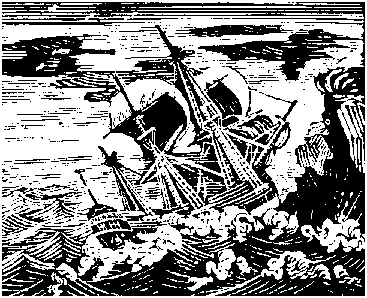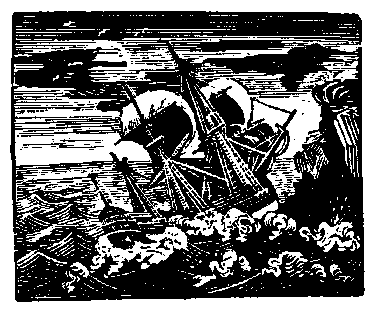Nutmeg
Or, The True and Incredible
Adventures of the Spice Trader
Who Changed the Course of History
Giles Milton
(Penguin)
 It was what they called "The Plague Years." The disease arrived in the early summer, year after year, and --- by the time what we now know as Pasteurella pestis died out in the fall --- it left tens of thousands of people in the grave, dying in the most grotesque way possible. Black tongues, great buboes in the armpits and the groin, eyes popping out of the head. None knew that this dreadful disease came from something as tiny and innocent looking as the flea that fed on rats.
It was what they called "The Plague Years." The disease arrived in the early summer, year after year, and --- by the time what we now know as Pasteurella pestis died out in the fall --- it left tens of thousands of people in the grave, dying in the most grotesque way possible. Black tongues, great buboes in the armpits and the groin, eyes popping out of the head. None knew that this dreadful disease came from something as tiny and innocent looking as the flea that fed on rats.Those who were rich enough fled to the country. The poor stayed huddled in their homes, unwilling to leave to shop, to be with anyone (Was it carried by the wind? Could it be caught by just breathing the same air as a victim?) You and I can never imagine what it was like to live through those summers when the only sound was the tolling of the death-bell, and the rumbling of wheels across the cobblestones, wagons loaded with pestiferous bodies.
But there was a cure. The doctors agreed. It was nutmeg. "This withered little nut," as Milton describes it, "until now used to cure flatulence and the common cold --- become as sought after as gold." And where did it grow? Half-way around the world, near what we now call Indonesia, on the tiny island of Run. To get it, investors would risk financial ruin, sailors would risk their lives. For going over twenty thousand miles there and back in the tiny caravels of 1600 could lead them into scurvy, malaria, the doldrums, tropical storms, keelhauling, battles with the Dutch, the Portuguese, and the headhunters of the Spice Islands.
Giles Milton has found a fascinating footnote of history, and expanded it with a writing style that is never dull. We get to know desperate men who died in order to bring prosperity to the East India Company: Sir James Lancaster, William Hawkins, John, David and Henry Middleton. We get to know the ghastly problems of passage; we get to know the diseases of the time; we get to know the Dutch. Even more than the English, they would use every means at their command to drive out competition, including lying, cheating, stealing, riling up the headhunters --- and even torture. When they took Nathaniel Courthope prisoner --- the same Nathaniel of the title --- the Dutch
kept many of us fast bound and fettered in irons, in the most loathsome and darke stinking dungeons, and gave us no sustenance, but a little durtie rice to eat...many have dyed, who were fetcht out of the dungeons and so basely buried, more like dogges than Christians.
 And it just wasn't the headhunters and the eternal battles. Those English left behind to guard the compounds often went mad with the boredom and stultification of it all. Bad food, unruly natives, fevers, hunger, delusions. One "factor" named William Nealson wrote the following to the East India Company, back in London,
And it just wasn't the headhunters and the eternal battles. Those English left behind to guard the compounds often went mad with the boredom and stultification of it all. Bad food, unruly natives, fevers, hunger, delusions. One "factor" named William Nealson wrote the following to the East India Company, back in London,
Morrow, bully; morrow morrow. To recover my health, I forgot not, fasting, a pot of blue burning ale with a fiery flaming toast and after (for recreation's sake) provided a long staff with a pike on the end of it to jump over joined stools with. Hem.
Hem indeed. It's a tale of colonialism at its worst --- with the Europeans acting like savages, out-savaging the savages. However, the key, according to Milton's thesis, is that the persistence of one Nathaniel Courthope saved the day. There he was, at Banda, surviving constant attack from the Dutch, with no food, and little ammunition, his men sick and dying. And yet his unwillingness to lie down and die (until finally, he had no choice) is what brought to the English the most wonderful bargain in the world.
Despairing of beating the Dutch in the spice trade, the brother of King Charles II turned eastward, to attack the Dutch colony of New Neatherland. And in 1667, both sides, weary of war, agreed, with the Treaty of Breda, that the Dutch would get the Island of Run. The English? They got the place we now call Manhattan.
Milton tells us that it all came about from "the courage of a simple trader, Nathaniel Courthope, whose defiance and heroism forty-seven years earlier had sparked an unstoppable train of events." Well, maybe. Or maybe the two sides had decided --- as colonialists have over the centuries --- that instead of bashing each over the head, that they would just divide up the world between them, ignoring the reality of those who lived in those lands. Just quit fighting like children, have a little peace --- so they could continue to rob the unsuspecting, and the innocent, not bother each other. It was time, they decided, to honor each other's thievery, and carve up the world. For the greater glory of the marketplace.
Sounds familiar, doesn't it?